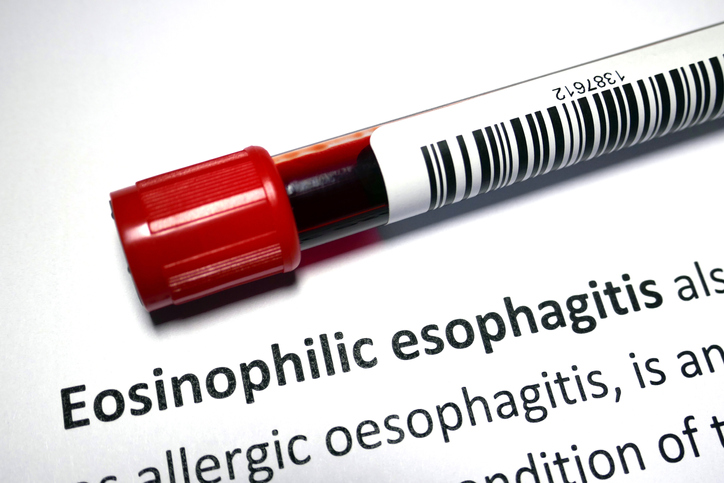
Eosinophilic esophagitis is a condition where a large number of white blood cells accumulate on the lining of the esophagus as the result of a reaction to certain foods, acid reflux or allergens.
The accumulation of white blood cells can cause irritation and scarring in the esophagus. This eventually can lead to severe narrowing, and the potential obstruction of the esophagus.
What are the symptoms of eosinophilic esophagitis?
In adults this can include:
- Difficulty swallowing
- Chest pain
- Heartburn
- Upper abdominal pain
- Food getting stuck in esophagus
In children the symptoms can include:
- Frequent regurgitation
- Abdominal pain
- Vomiting
- Food getting stuck in the esophagus
- Weight loss
- Poor growth
There are several environmental and genetic factors that may put some at risk of eosinophilic esophagitis more than others. The condition tends to run in families and is more common in males than females. It is seen more frequently in colder climates. There are more diagnoses in the spring and fall due to higher levels of pollen in the air.
How is this condition diagnosed? A physician will take a complete medical history, and order a test to check the levels of eosinophils in the blood. Doctors may also order an endoscopy to visually inspect the lining of the esophagus or a biopsy of the lining of the esophagus.
Treatment for this condition will require eliminating exposure to whatever is determined as the cause of an allergic reaction. Doctors may also recommend keeping the head of the bed elevated at night to prevent acid reflux and maintaining a healthy weight. They may also eliminate certain foods from a patient’s diet. Medications can also be prescribed to help keep symptoms under control.
If you would like to schedule an appointment with a physician at Jamaica Hospital Medical Center, please call 718-206-6742.
All content of this newsletter is intended for general information purposes only and is not intended or implied to be a substitute for professional medical advice, diagnosis or treatment. Please consult a medical professional before adopting any of the suggestions on this page. You must never disregard professional medical advice or delay seeking medical treatment based upon any content of this newsletter. PROMPTLY CONSULT YOUR PHYSICIAN OR CALL 911 IF YOU BELIEVE YOU HAVE A MEDICAL EMERGENCY.
